AI in customer service is reshaping customer expectations faster than most businesses can adapt. While many companies worry that automation will make their service feel cold and impersonal, the reality is that customers now expect the instant, intelligent responses that are often provided by AI-assisted processes.
Aloa has helped dozens of scaling businesses successfully deploy AI customer service solutions that enhance rather than replace human connections. Through our specialized chatbots and AI agents development services, we've learned what works, what fails, and how to navigate the complex balance between automation efficiency and customer satisfaction.
This guide walks through how artificial intelligence customer service is redefined in 2025, including:
- Core benefits and implementation strategies that preserve customer relationships
- Emerging technologies and human-AI collaboration models
- Common challenges and solutions for maintaining a personal touch
What is AI in Customer Service?
AI in customer service is the strategic implementation of artificial intelligence technologies to improve, automate, and optimize customer support interactions across all customer touchpoints.
Instead of replacing human agents, AI serves as an intelligent layer that handles routine tasks allowing employees to focus on problem-solving and relationship-building.
Core Capabilities of Artificial Intelligence in Customer Service
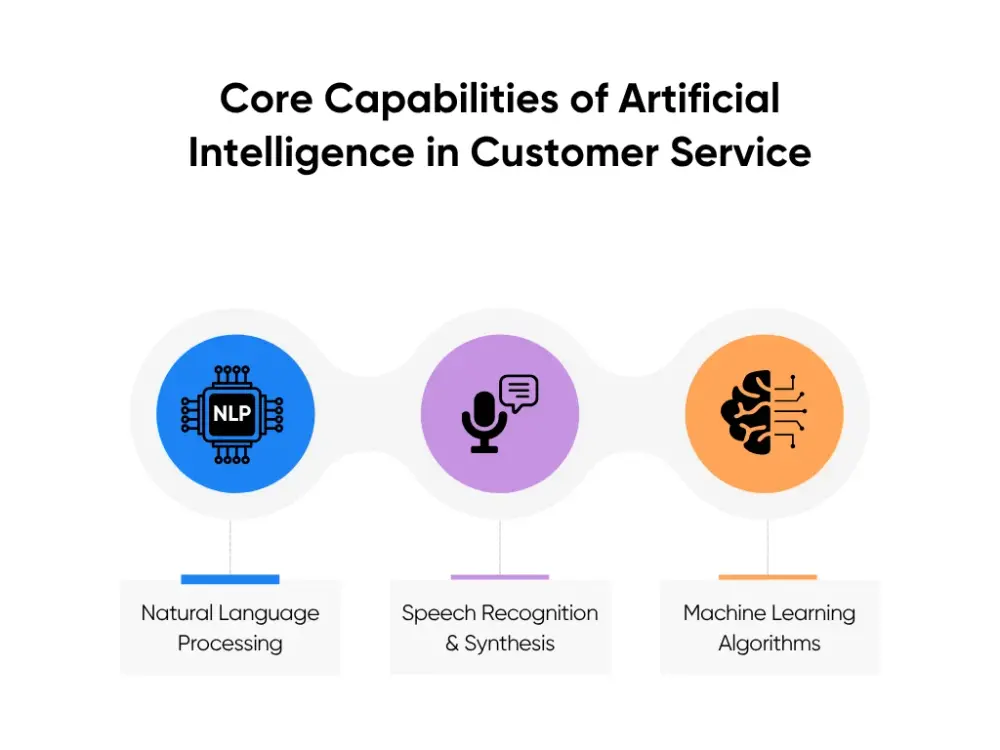
Customer service AI can understand customer intent, provide relevant responses, and automatically escalate complex issues to human specialists when needed. It does this through these core technologies:
- Natural language processing: NLP lies at the core of generative AI as a whole. It’s the main technology behind chatbots that engage in human-like conversations to handle routine inquiries.
- Speech recognition and synthesis: Enables voice assistants that provide phone support with natural speech patterns.
- Machine learning algorithms: Support intelligent routing systems that connect customers with the most qualified agents based on their specific needs and historical interactions.
The Key Benefits of AI in Customer Service
The business case for AI in customer service rests on four transformative benefits that directly impact both operational efficiency and customer satisfaction.
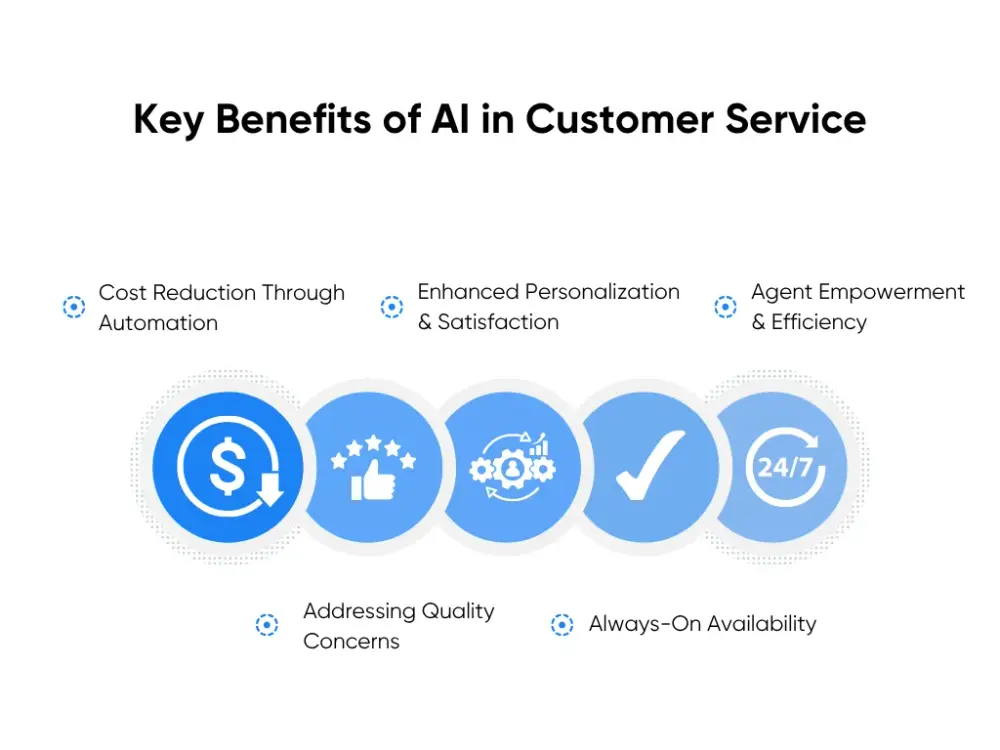
Cost Reduction Through Automation
According to the International Journal on Science and Technology, organizations implementing AI report average cost reductions of 31% while simultaneously improving customer experience metrics across all touchpoints.
AI excels at handling customer inquiries that follow predictable patterns, including:
- Password resets
- Order status checks
- Basic product information
- Account balance inquiries
According to Gartner, agentic AI will be capable of handling up to 85% of such customer interactions by 2029. By automating these routine interactions, businesses free human agents to focus on complex problem-solving and relationship building.
Companies like Bank of America demonstrate this potential. Their AI assistant Erica handles over 2 billion customer interactions every year. The result? 98% of customer queries get resolved within 44 seconds.
Improved Personalization and Satisfaction
AI customer service systems can:
- Track customer history
- Remember preferences and habits
- Predict needs based on customer groups
- Adjust tone depending on the situation and customer profile
This creates ultra-personalized behavior, leading to 17% higher customer satisfaction scores for companies with advanced AI setups.
Agent Empowerment and Efficiency
AI performs best as an intelligent assistant. This allows for capabilities such as:
- Providing real-time suggestions
- Instant access to knowledge bases
- Automated ticket classification
The implementation of AI increases agent efficiency by 33% while reducing the volume of basic tickets that require human intervention. AI ticketing systems software, in particular, can improve wait times by up to 30 minutes.
Agents also report feeling more effective and less frustrated when AI handles routine tasks, allowing them to develop expertise in complex problem resolution. According to IBM Institute for Business Value research, mature AI adopters reported a 15% higher human agent satisfaction score.
Addressing Quality Concerns
Many fear that AI will create impersonal, frustrating experiences. This concern is valid, but can be addressed through thoughtful implementation:
- Transparent communication about AI involvement
- Easy escalation to humans when needed
- Continuous optimization based on customer feedback
Organizations that maintain this balance report improved customer satisfaction instead of degradation. This proves that AI can increase service quality when implemented with customer needs as the primary focus.
24/7 Availability
Perhaps the most important aspect of AI integration in customer service is its 24/7 availability. Businesses that can provide steady support regardless of the time zone, holidays, or sudden demand spikes are at a significant advantage.
This availability meets modern customer expectations while cutting the operational complexity and costs tied to maintaining round-the-clock human staffing. The technology scales easily from hundreds to thousands of simultaneous interactions without performance loss.
Implementation Strategies for AI in Customer Service
Successful implementation of AI in customer service requires an approach that balances technological capabilities with customer experience preservation.
The most effective organizations follow a phased deployment strategy that starts with low-risk applications and gradually expands based on proven results and customer feedback.
Core AI Technologies and Tools
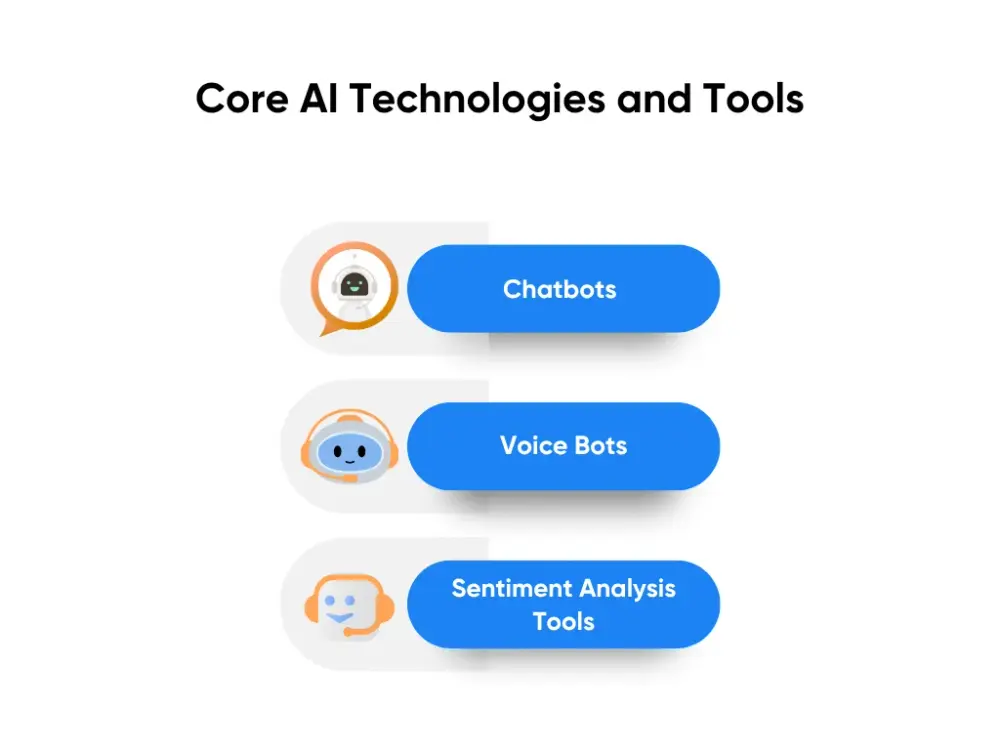
The foundation of effective artificial intelligence customer service lies in selecting the right combination of AI tools for your specific business needs.
- Chatbots: Serve as the primary interface for text-based interactions, handling everything from simple FAQs to complex multi-step processes. Modern chatbots use natural language processing to understand intent and context, enabling conversations that feel natural instead of robotic.
- Voice bots: Extend AI capabilities to phone support, using speech recognition and synthesis to handle verbal inquiries with human-like intonation and responsiveness. These systems can process accents, handle interruptions, and maintain conversational flow while accessing the same knowledge bases as their text-based counterparts.
- Sentiment analysis tools: Monitor customer sentiments and emotions throughout interactions, detecting frustration, satisfaction, or confusion in real-time, enabling dynamic response adjustment and automatic escalation when customers show signs of distress.
System Integration Essentials
The technical backbone of successful customer service AI implementation centers on seamless integration with existing ERP and CRM systems, even ones you build from scratch. This connectivity ensures AI agents have access to
- Complete customer histories
- Order information
- Account details necessary for providing accurate, personalized support
API-based integrations allow AI systems to retrieve and update customer information in real time, maintaining data consistency across all touchpoints. The most effective implementations create unified customer profiles that AI can reference to provide context-aware responses and make informed recommendations.
Legacy system compatibility often presents challenges, but modern AI platforms offer flexible integration options, including middleware solutions and custom connectors that bridge technological gaps without requiring complete system overhauls.
Security and Compliance Framework
Data protection forms a critical component of artificial intelligence in customer service implementation. Given the sensitive nature of information processed during customer conversations, GDPR, CCPA, and other regulations require you to:
- Gain explicit consent from data subjects to process their personal data
- Give a clear explanation for automated decisions
- Implement robust data minimization practices that collect only necessary information for specific service purposes.
AI compliance frameworks and measures such as end-to-end encryption are essential to staying aligned with these requirements. Regular security audits, staff training, and penetration testing ensure that your security systems are working as intended.
The Future of AI in Customer Service
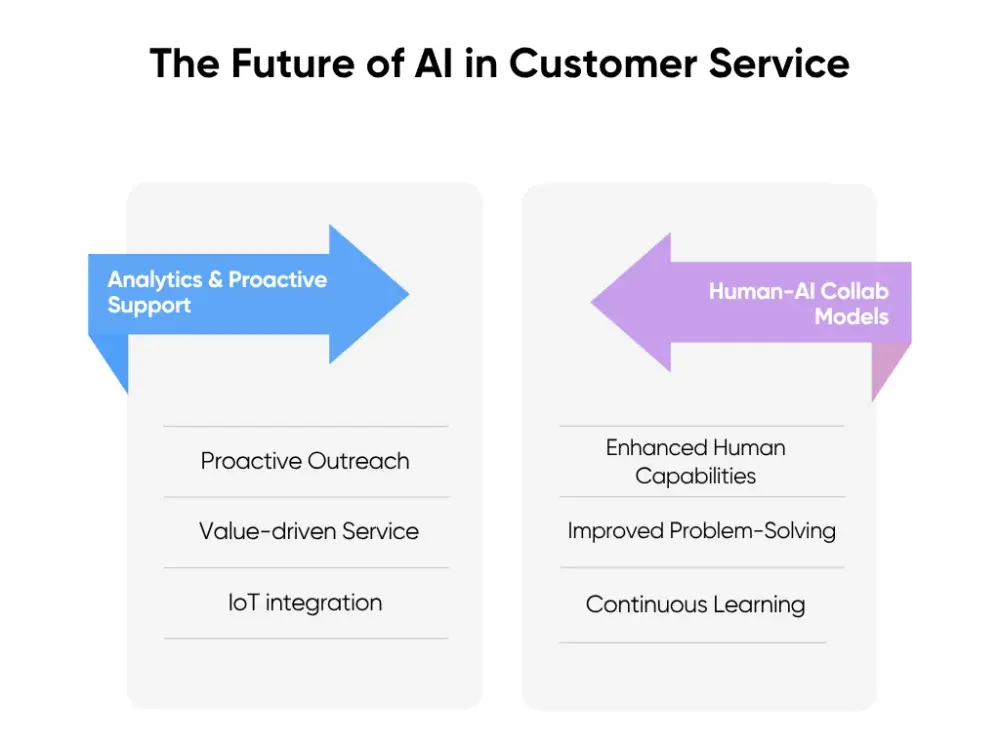
The future of customer service AI lies in smarter features that will completely change customer experience expectations and business operations. The next wave of new ideas focuses on predictive intelligence and smooth human-AI teamwork that boosts the strengths of both artificial and human intelligence.
Predictive Analytics and Proactive Support
Predictive analytics represents the next frontier in artificial intelligence customer service operations. Its main advantage is the ability to anticipate customer needs before issues arise. Advanced AI systems analyze behavioral patterns, customer data, and external factors to identify potential problems and proactively reach out with solutions. This shift from reactive to predictive service reduces customer effort while demonstrating genuine care for their success.
Key capabilities include:
- Proactive outreach: AI notifies customers about relevant product updates, suggesting optimization opportunities, or providing timely reminders about account activities.
- Value-driven service: Elevates the customer service experience by moving away from pure problem resolution into a way to enrich customer relationships, providing extra value and driving retention.
- IoT integration: AI connects with Internet of Things devices for real-time monitoring and automated issue resolution, where smart products communicate directly with customer service systems.
Human-AI Collaboration Models
The future of AI and customer service lies not in replacing human agents but in creating sophisticated hybrid models that leverage the unique strengths of both artificial and human intelligence. Smart escalation systems use context analysis and complexity scoring to determine the optimal point for transitioning interactions from AI to human agents.
These hybrid models feature:
- Enhanced human capabilities: Real-time AI assistance provides instant access to knowledge bases, suggests response templates, and offers predictive insights about customer needs.
- Improved problem-solving: Agents become more effective while AI handles routine tasks and information gathering.
- Continuous learning: AI learns from human support interactions, improving responses based on successful resolution patterns, creating a feedback loop where human expertise complements AI capabilities.
Implementing these advanced capabilities requires careful planning and technical expertise. Aloa builds AI customer service software from the ground up to integrate predictive analytics with human-centered service models. This gives you an intelligent support system that lets you keep the personal touch your customers value.
Challenges and Limitations
Despite the transformative potential of AI in customer service, organizations must navigate significant challenges that can undermine implementation success if not properly addressed. Understanding these limitations enables more realistic planning and better risk mitigation strategies.
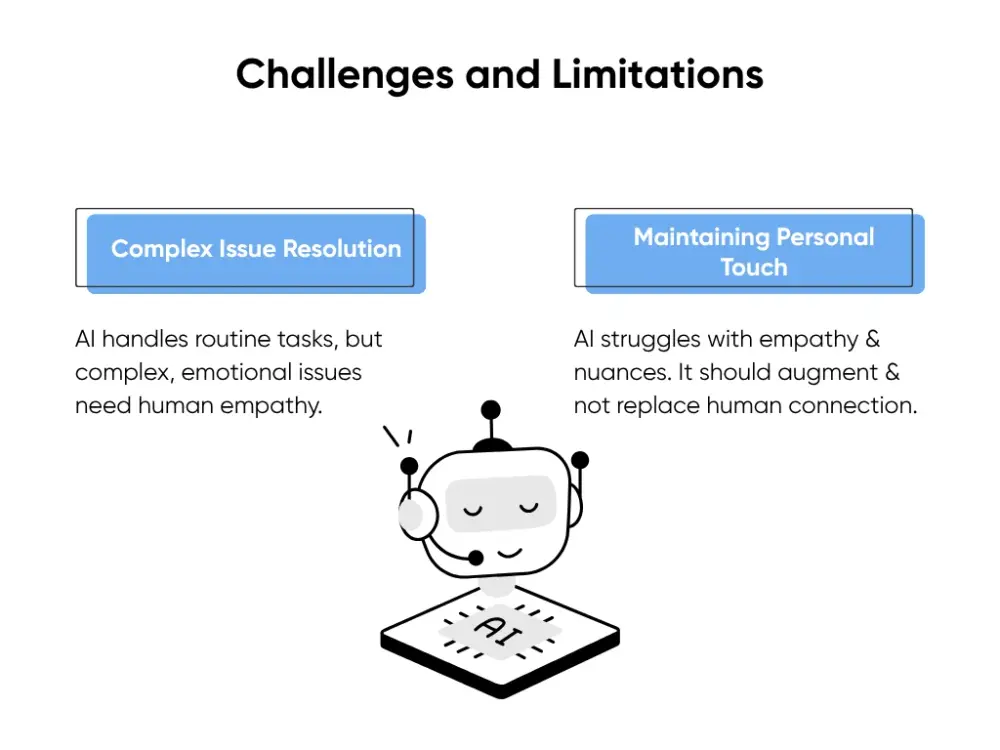
Complex Issue Resolution
While AI excels at handling routine inquiries, complex problems requiring creative thinking, emotional intelligence, or deep domain expertise remain firmly in human territory. Customers dealing with unique situations, seeking exceptions to policies, or working through emotionally charged issues need human empathy and judgment that current AI cannot replicate.
The challenge lies in accurately identifying when issues exceed AI capabilities and ensuring smooth handoffs that don't frustrate customers who have already invested time explaining their situation. Poor transition experiences can damage customer relationships more than never using AI at all.
Maintaining Personal Touch
One of the most significant challenges in artificial intelligence customer service implementation is preserving the human connection that builds customer loyalty and trust. Despite rapid improvements in natural language processing and emotional intelligence, AI struggles with genuine empathy, cultural nuances, and the subtle interpersonal skills that characterize exceptional customer service.
AI is not likely to be able to grasp these core interpersonal skills anytime soon. This is why the best way to maximize the benefit of AI is to dedicate it to routine support processes while human employees handle the more relationship-critical ones.
Conclusion
AI in customer service is fast becoming the foundation for meeting evolving customer expectations while building sustainable, efficient support operations.
The transformation ahead demands balancing efficiency gains with emotional intelligence, automation with personalization, and technological capability with human oversight. Companies that master this balance will deliver superior customer experiences while achieving operational excellence that drives competitive advantage.
Ready to transform your customer service with AI? Aloa builds custom AI solutions that let you scale quality customer service exponentially. Whether it’s chatbots or AI agents, we can create intelligent support solutions that drive both efficiency and customer satisfaction.
FAQs
What is AI in customer service?
AI in customer service refers to artificial intelligence technologies like chatbots, natural language processing, and predictive analytics that improve customer support by automating routine tasks, providing personalized responses, and enabling 24/7 availability while supporting human agents with intelligent assistance.
How does AI improve efficiency?
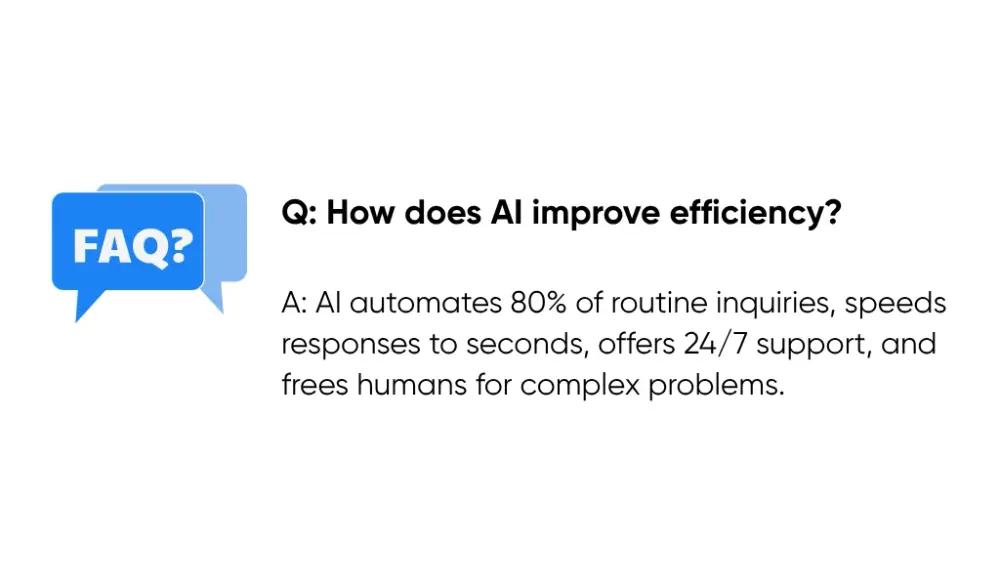
AI improves efficiency by automating up to 80% of routine customer inquiries, reducing response times from hours to seconds, enabling 24/7 support availability, and allowing human agents to focus on complex problems that require emotional intelligence and creative problem-solving.
What are the biggest challenges with AI in customer service?
The biggest challenges include maintaining personal touch and emotional connection, accurately handling complex issues that require human judgment, ensuring smooth escalation between AI and human agents, and addressing customer preferences for human interaction in sensitive situations.
How can companies maintain human touch with AI?
Companies maintain human touch by using AI as an intelligent layer that augments human interactions. This ensures easy escalation to human agents when needed, training AI systems to communicate with empathy and personality, and preserving human involvement for emotionally significant customer moments.
What will customer service look like in 2025?
Customer service in 2025 will feature seamless human-AI collaboration, predictive support that anticipates customer needs, instant personalized responses across all channels, and proactive outreach that prevents issues before they occur, all while maintaining the human connection customers value for complex and emotional interactions.

